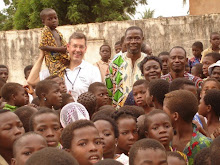FACEBOOK.COM FOUNDER DEEMED NEW ROLE MODEL
New York (April 24, 2007) -- Orphans International Worldwide (OIWW) has added Mark Zuckerberg, founder and CEO of the social-networking site facebook.com, to their list of GLOBAL HEROES & ROLE MODELS. This list includes such notables as Albert Schweitzer, Martin Luther King, the Rt. Rev. Desmond Tutu, Mother Teresa, Yitzchak Rabin, Nelson Mandela, Albert Einstein, Elie Wiesel, and many more.
Although Zuckerberg is not a Nobel Prize Winner, OIWW founder and president Jim Luce feels Zuckerberg’s story offers inspiration to OI’s children. “Without saints, secular or divine, sanctity can too easily be viewed as mere abstraction. Our children need heroes. The courage of Mahatma Gandhi and the brilliance of Albert Einstein make sainthood a reality for us all,” states Luce. “Mark Zuckerberg is a hero for the new era, a young man our children can aspire to emulate in addition to our own childhood heroes.”
Zuckerberg had been offered one billion dollars for his company, Facebook, by Yahoo! and turned it down. He claimed he wanted to build something for the long term and believes that the openness, collaboration, and sharing of information is a by-product of the social networking that can make the world a better place. Keeping his company in his own hands at this point allows him to continue on that important path.
“Orphans International is working to raise citizens who are Interfaith, Interracial, International, Intergenerational, and Internet-Connected,” states OI Advisor Lindsay Mure. “It is easy to see how Zuckerberg’s resolve and vision would be an excellent example for OI to hold up as a model for our children. I’m hoping to connect with him soon.” “He is living proof that young people can also impact the world. OI’s goal is to raise young adults who will become global citizens and leaders in the own communities. They need heroes,” she adds.
Orphans International America has received bi-partisan support from leaders such as former president Bill Clinton, Mayor Mike Bloomberg, former Governor George Pataki, Sen. Chuck Schumer, and Sen. Hillary Clinton. Orphans International is a non-partisan, interfaith organization incorporated in New York in 2002. OI Worldwide has been accredited by the United Nations Department of Public Information, OI America is designated as a 501(c)3 organization by the IRS.
OI’s children remain in their native countries to become educated to their fullest potential and then to help move their own countries forward; OI does not place children for adoption in America. Projects now are running in Indonesia, Haiti, and will open in May in Sri Lanka and El Salvador. Each OI campus is working towards full programming for their orphaned children, with classes for English, computer science, and a strong emphasis on the arts. Each project is fully integrated into the local community.
More detailed information is available on both OI’s website, www.oiww.org and wikipdedia.com The organization’s monthly e-newsletter is available on-line (pdf), as is the founder’s inspirational story, Riding the Tiger (pdf). Tax-deductible contributions may be sent to “Orphans International,” at 540 Main Street, Suite 418, N.Y., N.Y. 10044. Last year less than 9% of OI America’s income was spent on administration.
– 30 –
Warm regards,
Jim Luce, Founder
Orphans International Worldwide
Associated with the U.N. Dept. of Public Information
540 Main Street #418
New York, N.Y. 10044
O: 212/755-7285
F: 212/755-7302
jim@oiww.org
http://www.oiww.org
Wikipedia:
http://en.wikipedia.org/wiki/Orphans_International


